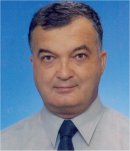|
Plenary
Lecture
Oncoming Revolution for Ship Propulsion - Fuel Cells

Professor Deniz Unsalan
Piri Reis University
Istanbul, Turkey
E-mail:
denizunsalan@gmail.com
Abstract: Fuel cells are electrochemical devices
that produce electric current while oxidation of a fuel
takes place. A classical fuel cell uses molecular
hydrogen as the fuel and atmospheric air as the oxidant,
and water vapour is the output. Since the efficiency of
a fuel cell is not limited by the second law of
thermodynamics and does not produce carbon dioxide, fuel
cells are the candidate power systems of the future.
The history of fuel cells dates to mid-19th century.
Interest has been revived in early 1960’s as power
sources for spacecraft. Several types of fuel cells have
been developed in the recent decades, and applications
to other areas have been made. The main problems for
fuel cells are centered around the technical problems
related to the storage of molecular hydrogen. However,
hydrogen can also be in-situ obtained from a
conventional hydrocarbon fuel by a reforming process.
Main marine applications of fuel cells for today have
been for the air-independent propulsion of submarines
and urban waterway transportation. However, the
advantages offered by them has induced researchers to
study fuel cells as power sources for ship propulsion
and auxiliary services, which is the main topic of this
presentation. Advantages to be obtained by the use of
fuel cells from a ship designers and operators point of
view are outlined, and as a candidate case, the concept
for the power plant of a hypothetical frigate is
explained.
Brief Biography of the Speaker:
Deniz Unsalan was born in Izmir, Turkey in 1953. He was
educated in Ankara and Istanbul, receiving his
undergraduate education from the Turkish Naval Academy
in 1973. He served in the Turkish Navy ships before and
after his postgraduate education. He received “Master of
Science” and “Mechanical Engineer” degrees from the
Naval Postrgraduate School at Monterey, California in
1980. He was a British Council Scholar at the University
of Newcastle upon Tyne, U.K. between 1982-1984. He
received his Doctor of Philosophy degree in Naval
Architecture in 1993 from the Istanbul Technical
University.
He was a lecturer in Marine Engineering at the Turkish
Naval Academy between 1987 and 1994, Assistant Professor
at Istanbul Technical University Maritime Faculty
between 1994 and 1996, Associate Professor at Near East
University between 1996-2003, at Dokuz Eylul University
Institute of Marine Sciences and Technology between
2003-2009. He became a full Professor in 2006. Currently
he is a Professor of Marine Engineering at the Piri Reis
University in Istanbul, Turkey.
|
